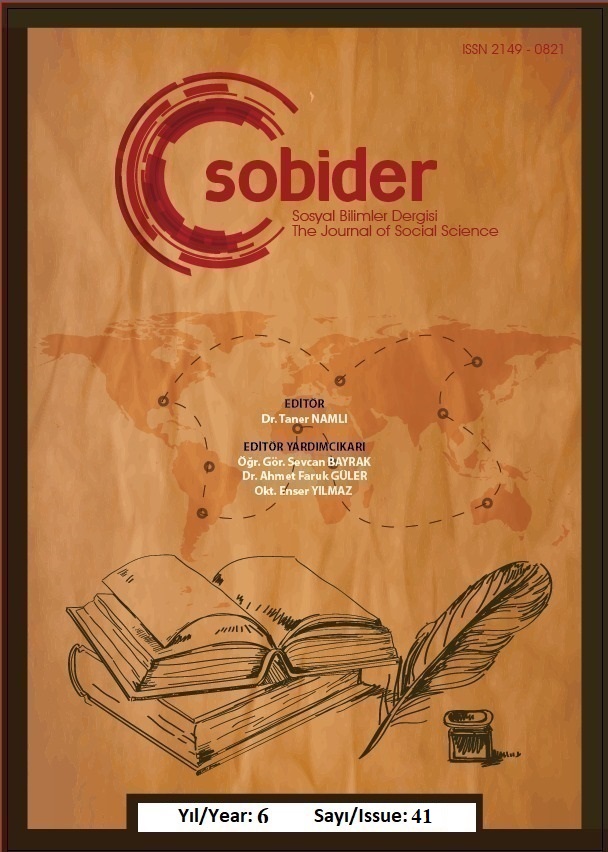ANADOLU’DA BİR SAHTE PAŞA (ULEMÂDAN LAZ ALİ EFENDİ’NİN, HAKKI PAŞA ADIYLA ANADOLU’DAKİ SERÜVENİ) A FAKE PASHA IN ANATOLIA
Author :
Abstract
Osmanlı bürokrasisinde önemli bir yere sahip olan ilmiye sınıfı mensupları devlet yönetiminde zamanla ciddi kazanımlar elde etmişlerdi. Elde edilen kazanımların asırlarca sürdürebilmesinde diğer zümrelere göre devlet tarafından kendilerine ihsan edilmiş olan muafiyetlerin de önemi vardır. İslâm dininin ilme ve âlime vermiş olduğu önemin bir yansıması olan bu tutumun sonucunda ilmiye mensupları müsadere, idam ve kürek gibi cezalardan muaf tutulmuşlardır. İstanbul’dan yola çıkarak Anadolu’da kendisini çeşitli unvanlarla birlikte paşa ve vezir olarak ilan eden ulemâ kökenli Laz Ali, etrafına topladığı askerlerle birçok devlet yetkilisini ve halkı kendisine inandırmıştır. Yaptığı bu hileyle gezdiği yerlerin mahallî idarecilerinden çeşitli pahalı hediyeleri toplayan bu şahıs sonunda yakalanarak cezalandırılmıştır. Laz Ali ulemâdan olması ve tavassutta bulunan bazı devlet ricalinin da etkisiyle idam veya kürek cezası yerine daha hafif bir ceza olan sürgünle tecziye edilmiştir.
Keywords
Abstract
The members of ilmiye class, which had an important place in the Ottoman bureaucracy, acquired significant gains over time in state government. In the maintenance of the gains obtained for centuries, also the exemptions granted to them by the state in comparison with other groups have importance. As a result of this attitude which is a reflection of the importance given to the science and scientist of Islamic religion, members of the class were exempted from penalties such as confiscation, execution and penal servitude. Laz Ali who proclaimed himself as pasha and vizier with various titles in Anatolia, convinced many government officials and people with the soldiers he gathered. This person who collected various expensive gifts from the local administrators of the places he visited with this trick was eventually caught and punished. With the influence of being of Ulamâ class and some intermediary statesmen, Laz Ali was suspended by exile which was a lighter punishment instead of execution or penal servitude.
Keywords
- Akgündüz, Ahmed, Osmanlı Kanunnâmeleri ve Hukukî Tahlilleri-Osmanlı Hukukuna Giriş ve Fatih Devri Kanunâmeleri, Osmanlı Araştırmaları Vakfı, Fey Yayınları, İstanbul 1992.
- Baytimur, Suha Oğuz, Osmanlı Devleti’nde Hapis ve Sürgün Cezaları (1791–1808), Yayınlanmamış Doktora Tezi, Fırat Üniversitesi, SBE, Elazığ 2011.
- Beşirli, Mehmet, Orta Karadeniz Kentleri Tarihi I Tokat, Gaziosmanpaşa Üniversitesi, Tokat 2005.
- Beyazıt, Yasemin, Osmanlı İlmiyye Mesleğinde İstihdam (XVI. Yüzyıl), Türk Tarih Kurumu, Ankara 2014.
- Canatar, Mehmet, “Osmanlı Devleti'nde Kavaslar ve Kavas Teşkilatı”, İlmî Araştırmalar, İlim Yayma Cemiyeti Yay. , S.4, İstanbul 1997.
- Devellioğlu, Ferit, Osmanlıca-Türkçe Ansiklopedik Lügat, Aydın Kitabevi, Ankara 2013.
- İnalcık, Halil, Osmanlı İmparatorluğu Klasik Çağ.(1300-1600), çev. Ruşen Sezer, Yapı Kredi Yay. İstanbul 2003, BOA, C_ZB_29_1410_01. (7 Rebiü’l-evvel 1252/22 Haziran 1836).
- Kanat, Sedat, Sultan II. Abdülhamid döneminde Mâbeyn-i Hümâyûn ve görevleri (kurumsal, yönetsel ve işleyiş olarak) ,Yayınlanmamış Doktora Tezi, Atatürk Üniversitesi, Türkiyat Araştırmaları Enstitüsü, Erzurum 2018,
- Karataş, Ali İhsan, Osmanlı Dönemi Bursa Sürgünleri (18-19. Asırlar), Emin Yayınları, İstanbul 2009.
- Kütükoğlu, Mübahat S. , Osmanlı Belgelerinin Dili (Diplomatik), Kubbealtı Akademisi Kültür ve Sanat Vakfı, İstanbul 1998,
- Mardin, Şerif, Türkiye'de Din ve Siyaset Makaleler 3, der. Tuncay Önder, , İletişim Yayınlan, İstanbul 2002.
- Ocak, Ahmet Yaşar, Osmanlı Toplumunda Zındıklar ve Mülhidler (15-17. yüzyıllar), Tarih Vakfı Yurt Yayınları, İstanbul 2003.
- Tekeli, İlhan-Selim İlkin, Osmanlı İmparatorluğu’nda Eğitim ve Bilgi Üretim Sisteminin Oluşumu ve Dönüşümü, Türk Tarih Kurumu Basımevi, Ankara 1993.
- Zilfi, Madeline C. , Dindarlık Siyaseti Osmanlı Uleması Klasik Dönem Sonrası, çev. Mehmet Faruk Özçınar, Birleşik Yayınevi, Ankara 2008.
- Akyıldız, Ali, “Mâbeyn-i Hümâyun”, TDV İslâm Ansiklopedisi, Cilt 27, İstanbul 2003, s.283- 286;
- İnalcık, Halil, “Sultanizm Üzerine Yorumlar: Max Weber’in Osmanlı Siyasal Sistem Tiplemesi”, Toplum ve Ekonomi, S.7, 1994, s.13.
- İpşirli, Mehmet, “İlmiye”, TDV İslâm Ansiklopedisi, C.22, İstanbul 2000, s.141.
- ……………….., “Ehl-i Örf”, TDV İslâm Ansiklopedisi, C.X, İstanbul1994, s.519-520.
- Tabakoğlu, Ahmet, “Tekâlîf”, TDV İslâm Ansiklopedisi, C.40, İstanbul 2011, s.336-337.





